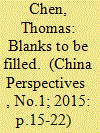|
|
|
Sort Order |
|
|
|
Items / Page
|
|
|
|
|
|
|
| Srl | Item |
| 1 |
ID:
138591


|
|
|
|
|
| Summary/Abstract |
Jia Pingwa’s Decadent Capital was wildly popular upon its publication in 1993. Offering plenty of sex and a bleak view of Chinese society under reform, it was also highly controversial, not least because of the blank squares strewn throughout the text to represent erotic descriptions edited out by the author. Commentators accused Jia of selling out high culture, much like the intellectuals portrayed in the narrative. The novel was banned in 1994 but rereleased in 2009 with one major change: the blank squares were replaced by ellipses. I argue that these blank squares not only make public censorship itself but also constitute the space of alternative publics, whether harking back to an elided past or projecting into a future yet to be written, that the post-Tiananmen Party-state tries to nullify. KEYWORDS: Jia Pingwa, censorship, publishing industry, postsocialism, dystopia, utopia, Tiananmen Square, public, criticism, Lu Xun.
|
|
|
|
|
|
|
|
|
|
|
|
|
|
|
|
| 2 |
ID:
157517


|
|
|
|
|
| Summary/Abstract |
In the late 1920s, cultural nationalism in Hong Kong was imbedded in Confucianism, having been disappointed with the New Culture Movement and Chinese revolutionary nationalism.1 It also inspired British collaborative colonialism. This study attempts to explain the link between Hong Kong and the Confucius Revering Movement by analysing the essays on Hong Kong of Lu Xun (1881–1936), the father of modern Chinese literature and one of the most important revolutionary thinkers in modern China. The Confucius Revering Movement, which extended from mainland China to the Southeast Asian Chinese community and then to Hong Kong, formed a highly interrelated network of Chinese cultural nationalism associated with Confucianism. However, the movements in these three places had different cultural and political roles in keeping with their own contexts. Collaborative colonialism’s interference with the Confucius Revering Movement is one way to understand Lu Xun’s critical reading of Hong Kong. That is, Hong Kong’s Confucius Revering Movement was seen as an endeavour of the colonial authorities to co-opt Confucianism in order to deal with influences from China. This article argues that Hong Kong’s Confucius Revering Movement should be regarded as one of the main perspectives through which to understand Hong Kong’s educational, cultural and political histories from the 1920s to the late 1960s. Lu Xun enables us to see several links. The first link is the one connecting the Confucius Revering Movement in Mainland China, Hong Kong and the Chinese community in Southeast Asia. This leads to the second link, that is, Lim Boen Keng (Lin Wenqing), the leading figure of the Confucius Revering Movement in the Southeast Asian Chinese community who later became the President of Amoy University, where Lu Xun had taught before his first visit to Hong Kong. The third link is the skilful colonial administrator Sir Cecil Clementi, who came to British Malaya in February 1930 to become Governor after being the Governor of Hong Kong. We can observe a network of Chinese critical/resistant and collaborative nationalism from these links.
|
|
|
|
|
|
|
|
|
|
|
|
|
|
|
|
|
|
|
|
|